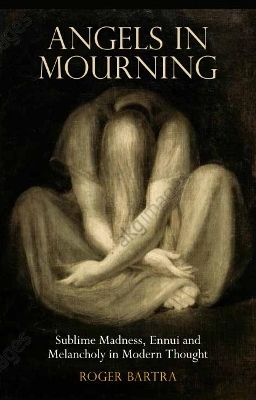
Angels in Mourning
Sublime Madness, Ennui and Melancholy in Modern Thought
Seiten
2018
Reaktion Books (Verlag)
978-1-78023-972-9 (ISBN)
Reaktion Books (Verlag)
978-1-78023-972-9 (ISBN)
In this surprising and insightful study, Roger Bartra explores how three lucid European thinkers - Immanuel Kant, Max Weber and Walter Benjamin - addressed melancholy, a condition of imbalance, chaotic and desolate, and a keystone of modern Western thought.
Sublime madness and ennui: melancholy is a condition of imbalance, chaotic and desolate, and a keystone of modern Western thought. In Angels in Mourning, Roger Bartra explores how three lucid European thinkers - Immanuel Kant, Max Weber and Walter Benjamin - addressed the irrational and the dolorous, drawing attention to some apparently marginal aspects of their work in order to illuminate the way in which they gazed into the darkness.
It is not obvious why melancholy should find such a prominent space in our society. Why did this threatening expression of langour and disorder gain such a foothold at the heart of a European culture guided by the light of rationalism? In this surprising and insightful study, Bartra considers this question through investigations of Kant, Weber and Benjamin, and suggests that one explanation may lie in the blossoming of Romanticism, that deep-seated protest against the Enlightenment and the capitalist order.
Sublime madness and ennui: melancholy is a condition of imbalance, chaotic and desolate, and a keystone of modern Western thought. In Angels in Mourning, Roger Bartra explores how three lucid European thinkers - Immanuel Kant, Max Weber and Walter Benjamin - addressed the irrational and the dolorous, drawing attention to some apparently marginal aspects of their work in order to illuminate the way in which they gazed into the darkness.
It is not obvious why melancholy should find such a prominent space in our society. Why did this threatening expression of langour and disorder gain such a foothold at the heart of a European culture guided by the light of rationalism? In this surprising and insightful study, Bartra considers this question through investigations of Kant, Weber and Benjamin, and suggests that one explanation may lie in the blossoming of Romanticism, that deep-seated protest against the Enlightenment and the capitalist order.
Roger Bartra is Emeritus Researcher at Mexico's National Autonomous University and Honorary Research Fellow at Birkbeck College, University of London. His publications include Anthropology of the Brain (2014) and The Imaginary Networks of Political Power (2013).
| Erscheinungsdatum | 18.09.2018 |
|---|---|
| Verlagsort | London |
| Sprache | englisch |
| Maße | 138 x 216 mm |
| Themenwelt | Geisteswissenschaften ► Philosophie ► Geschichte der Philosophie |
| Geisteswissenschaften ► Philosophie ► Philosophie der Neuzeit | |
| ISBN-10 | 1-78023-972-6 / 1780239726 |
| ISBN-13 | 978-1-78023-972-9 / 9781780239729 |
| Zustand | Neuware |
| Haben Sie eine Frage zum Produkt? |
Mehr entdecken
aus dem Bereich
aus dem Bereich
die kolonialen Wurzeln der französischen Theorie
Buch | Hardcover (2024)
Matthes & Seitz Berlin (Verlag)
28,00 €
eine Geschichte der Zuversicht von Homer bis zum Klimawandel
Buch | Hardcover (2024)
C.H.Beck (Verlag)
28,00 €


